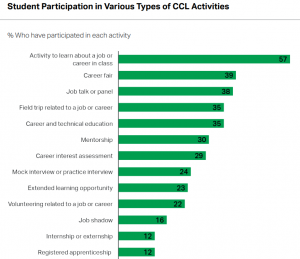Advance CTE’s “Research Round-Up” blog series features summaries of relevant research reports and studies to elevate evidence-backed Career Technical Educational (CTE) policies and practices and topics related to college and career readiness. This month’s blog highlights the impact of career-connected learning on learner engagement and hope. These findings align with Advance CTE’s vision for the future of CTE where each learner skillfully navigates their own career journey.
![]() The New Hampshire Learning Initiative (NHLI) partnered with Gallup to survey a group of New Hampshire learners to better understand the impact of Career Connected Learning (CCL). Specifically, this study sought to measure the interactions between CCL participation, school engagement and hope among middle school and high school learners. CCL is an education strategy aiming to boost learners’ knowledge of potential career options and the skills needed for those careers. CCL bridges CTE and core academic classroom experiences to expand career exploration and work-based learning opportunities.
The New Hampshire Learning Initiative (NHLI) partnered with Gallup to survey a group of New Hampshire learners to better understand the impact of Career Connected Learning (CCL). Specifically, this study sought to measure the interactions between CCL participation, school engagement and hope among middle school and high school learners. CCL is an education strategy aiming to boost learners’ knowledge of potential career options and the skills needed for those careers. CCL bridges CTE and core academic classroom experiences to expand career exploration and work-based learning opportunities.
This sample included 9,600 learners, across grades 5-12 from 28 schools and 13 districts throughout the state of New Hampshire.
In this study, participating in CCL opportunities, as explained in the chart below, was measured by engagement and hope.
- Engagement indicates the degree to which learners are involved in and are enthusiastic about school
- Hope refers to the ideas and energy learners have for the future
Findings from the Gallup-NHLI learner poll demonstrate strong relationships between learners’ career-connected learning participation and their hope and engagement. These encouraging results indicate that CCL opportunities may help move the needle in improving learner outcomes.
- Learners in fifth and sixth grades (37%) are the most likely to be engaged out of all learners in grades 5-12. Starting career exploration early could be more impactful when paired with high levels of engagement.
- The vast majority of learners (88%) report participating in at least one career-connected learning opportunity.
- Career-connected learning opportunities that match learners’ interests are more likely to inform their plans.
- Those who agree they have a mentor who supports their development are more likely to be hopeful about the future than their peers who do not have such a mentor (40% vs. 25%).
- Those who agree they have a mentor who supports their development are more likely to be engaged than their peers who do not have such a mentor (37% vs. 16%).
- This study found a strong relationship between engagement levels and whether a learner says “I know I will graduate from high school”. This connection is the most pronounced among learners who report receiving average or poor grades. For example, among engaged middle schoolers with average or poor grades, 86% of students believe they will graduate from high school, compared to 67% of not-engaged learners.
What type of Career Connected Learning activities were observed in this study?
CCL learning opportunities occur in various ways within schools or even in the community. Common types of CCL include learning about a job or career in their core academic courses, participating in a career fair or attending a job talk or panel. The graph below demonstrates the frequency of learner participation in various types of CCL activities.

About one in three high school students (35%) — and one in four middle school students (26%) — say CCL opportunities at their school have informed what they plan to do after high school.
These results are encouraging and provide educators and leaders with the data they need to best foster learner success — an important step in closing the gap between the skills learners have and the jobs employers need to fill. Partnerships between industry and school districts to increase the frequency of CCL could increase knowledge of local and regional opportunities and peak learner interest. For state and local leaders seeking to leverage the power of CCL in CTE programs, consider the following:
-
- Conduct climate surveys to understand the current state and availability of CCL-type activities.
- Investigate the process for creating partnerships with local and regional industry leaders to ensure that CCL opportunities are aligned with career pathways.
- Assess the current strategies for communicating the CCL that are available to learners and their families.
- Creating opportunities for learners to engage in CCL during the school day in their core courses mitigates barriers presented by transportation, geography or conflicting school schedules.
Please visit Advance CTE’s Learning that Works Resource Center for resources to support connecting the learner experiences in the classroom to careers.
- With Learners, Not for Learners: A Toolkit for Elevating Learner Voice in CTE: This toolkit provides state and local CTE leaders with actionable resources, guidance and tools to ensure CTE learner voices are elevated and heard for the improvement of CTE policies and practices.
- ECMC’s Question the Quo Report: This national report highlights Gen Z’s desire for increases in the information and opportunities to explore career options.
Amy Hodge, Membership and Policy Associate


 A
A 